

Book Recommendations from Nassim Taleb. Generation Stuck: Why Don't Young People Move, Anymore? - Derek Thompson - Business. The real reason why the Go-Nowhere Generation isn't going anywhere [Update: In this comment section and on our Facebook page, we're collecting stories about Americans moving -- and not moving.
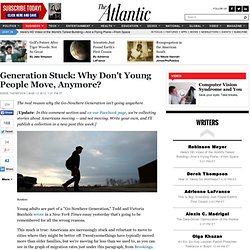
Write your own, and I'll publish a collection in a new post this week.] Reuters Young adults are part of a "Go-Nowhere Generation," Todd and Victoria Buccholz wrote in a New York Times essay yesterday that's going to be remembered for all the wrong reasons. This much is true: Americans are increasingly stuck and reluctant to move to cities where they might be better off. Once you strip away the pop-science, there is a good and big point at the heart of this piece: Americans don't move around like we used to. Like the fall in homeownership, and the decline of marriage, the slowdown in American migration is a long-term trend that accelerated in the recession.
Let's start with cost. Alright, you might say, so that's an argument for these kids to move somewhere they can get a job. Ray Dalio’s Richest and Strangest Hedge Fund. Ray Dalio, the sixty-one-year-old founder of Bridgewater Associates, the world’s biggest hedge fund, is tall and somewhat gaunt, with an expressive, lined face, gray-blue eyes, and longish gray hair that he parts on the left side.
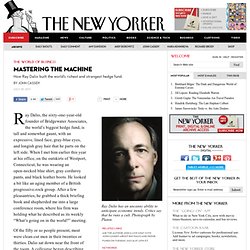
When I met him earlier this year at his office, on the outskirts of Westport, Connecticut, he was wearing an open-necked blue shirt, gray corduroy pants, and black leather boots. He looked a bit like an aging member of a British progressive-rock group. After a few pleasantries, he grabbed a thick briefing book and shepherded me into a large conference room, where his firm was holding what he described as its weekly “What’s going on in the world?” Meeting. Of the fifty or so people present, most were clean-cut men in their twenties or thirties. Dalio is a “macro” investor, which means that he bets mainly on economic trends, such as changes in exchange rates, inflation, and G.D.P. growth. Dalio asked for another opinion. Dalio is rich—preposterously rich. Millennials paralyzed by choice. Editor’s Note: Priya Parker, an expert-in-residence at the Harvard Innovation Lab, is the founder of Thrive Labs, a visioning and strategy advisory firm based in Brooklyn, New York.
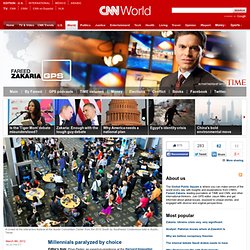
You can follow Priya on Twitter @priyaparker. By Priya Parker – Special to CNN If January is when the old guard gathers in Davos, Switzerland, March is when the new guard descends on Austin, Texas. At a time of crisis in America, Europe, the Middle East and beyond, a group of tech-savvy do-gooders meets, greets and tweets at South By Southwest.
The conference has experienced a surge in popularity in recent years, exploring questions well beyond the sphere of technology. I run an advisory firm that works with leaders young and old to conceive and implement bold, authentic visions. What I found was a rising generation of elite leaders who bring wonderful new gifts to the table – more empathy than their predecessors, more worldliness, more pragmatism for an angry, ideological age. The importance of stupidity in scientific research. I recently saw an old friend for the first time in many years.
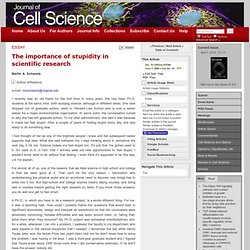
We had been Ph.D. students at the same time, both studying science, although in different areas. She later dropped out of graduate school, went to Harvard Law School and is now a senior lawyer for a major environmental organization. At some point, the conversation turned to why she had left graduate school. To my utter astonishment, she said it was because it made her feel stupid. After a couple of years of feeling stupid every day, she was ready to do something else. Fragmentary: Writing in a Digital Age. More and more, I read in pieces.
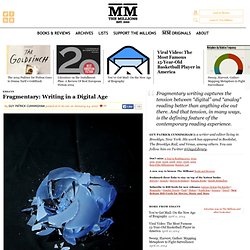
So do you. Digital media, in all its forms, is fragmentary. Even the longest stretches of text online are broken up with hyperlinks or other interactive elements (or even ads). This is neither a good nor bad thing, necessarily — it is simply a part of modern reading. Don't Let What You Know Limit What You Imagine - Bill Taylor. One of the most perplexing features of these troubled times is that so many capable people in so many fields look so lost and ineffective.

Whether it’s the stubborn inefficiencies of the health-care system, the ever-rising costs of the higher-education system, even the slow-motion collapse of the US postal system, leaders with unrivaled expertise and decades of experience can’t seem to develop creative solutions to dire problems. Why are so many smart executives so ineffective? One answer may be that all this experience is itself a problem.